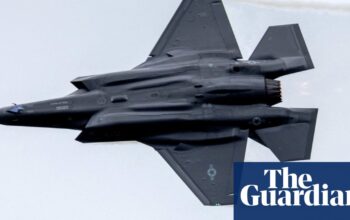
The United States and the United Kingdom have carried out another set of attacks on the Houthis in an effort to prevent the rebel group from attacking ships in the southern Red Sea.
A statement issued by both nations announced that they had carried out “further appropriate and essential attacks” on eight Houthi objectives, with assistance from Australia, Bahrain, Canada, and the Netherlands.
The number of targets hit in the first air strikes on Yemen by the two countries 10 days ago was significantly higher at 60, compared to the current attack. The impact and number of casualties from this attack is unknown.
This month’s eighth strike on Houthi targets by the US and second time the UK has joined.
US officials were informed that the two countries were launching attacks using fighter jets and cruise missiles launched from ships. Initial footage and reports on social media showed explosions occurring around Sana’a, the capital controlled by the Houthi group.
At just before midnight in Yemen, the bombing occurred, according to the US Central Command, which oversees the Middle East. The targets consisted of missile launchers, air defense systems, radars, and weapons storage facilities located underground.
The British Ministry of Defence announced that four RAF Typhoon jets carried out airstrikes on two military sites near the Sana’a airfield. This location was reportedly being used to launch attacks on ships in the Red Sea.
The UK’s defense secretary, Grant Shapps, announced that they, along with their US allies, have carried out additional strikes in order to protect themselves. These strikes were aimed at weakening the Houthi group’s resources and their ability to disrupt international trade.
There were no initial reports of injuries, however, the UK Department of Defense stated that they took great care in planning the strikes to minimize the potential harm to civilians. They also mentioned that the bombing was carried out at night, in part, to reduce this risk.
The UK government did not seek parliament’s approval for the recent military strikes, citing self-defense against Houthi attacks on US and UK warships two weeks ago. It is reported that Labour leader Sir Keir Starmer was not consulted prior to the operation on Monday.
Mohammed Albukhaiti, a member of the Houthi’s governing council, maintained that the rebel organization would persist in opposing the western powers. However, it is not certain how much of an impact the recent series of attacks has had on their military strength.
“The aggression of the United States and Britain will only strengthen the determination of the Yemeni people to fulfill their ethical and humanitarian duties towards those suffering in Gaza. According to him, the conflict at hand is between Yemen, striving to put an end to acts of genocide, and the American-British alliance, which aims to defend and support the perpetrators of such crimes.”
Before the night was over, Joe Biden had a conversation with Rishi Sunak regarding the Red Sea emergency. He stressed the importance of persistently “disrupting and degrading” the Houthi military’s abilities, possibly alluding to the use of military force.
John Kirby, spokesperson for the White House, stated that the American president and the British prime minister had a conversation on Monday regarding the ongoing Houthi assaults on ships traveling through the Red Sea and the Gulf of Aden in the past week.
Avoid the newsletter advertisement.
after newsletter promotion
Kirby informed reporters in Washington that there was discussion about the ongoing situation in the Red Sea and the importance of maintaining an international, multilateral approach to disrupting and weakening Houthi capabilities. This may have been in reference to potential military intervention.
In the evening UK time, Sunak and Biden of the UK had a conversation where they addressed topics such as the ongoing conflict in Gaza and financial support for Ukraine. The British report stated that the two leaders denounced the increase in aggressive attacks by the Houthi group and expressed their commitment to using diplomatic means to pressure Iran to stop supporting them. They also agreed to take necessary military action to weaken the Houthi’s capabilities if needed.
10 days ago, Britain and the US collaborated to launch 150 missiles at numerous Houthi targets in Yemen. This was in response to a string of attacks by the rebel group on ships traveling through the Red Sea region dating back to mid-October. The US has also continued to carry out bombings in the region in the days following.
However, despite the attacks led by the US, the Houthi threat remains and there were three reported attacks on merchant ships last week. The Houthis are determined to continue resisting, as shown by their actions. According to the rebel group, their targets are Israel and its western allies, as they support Palestinians in Gaza and aim to disrupt the waterway.
On Monday, the Houthi movement alleged that its forces had initiated a missile strike on the US naval vessel Ocean Jazz in the Gulf of Aden. However, the US refuted this claim.
According to a statement from Houthi military spokesperson Yahya Sarea, the armed forces of Yemen are responding to any acts of aggression by the US or UK against their country by attacking any potential sources of danger in the Red and Arab Seas.
Not long after, the United States’ fifth fleet, based in the Middle East, stated that the claims of a successful attack on Ocean Jazz were untrue.
The fleet stated through X that they had continuously communicated with Ocean Jazz during its safe journey, according to the naval operational headquarters.
Two members of the US Navy Seals were declared deceased on Sunday after being reported missing during a mission to capture Iranian weapons intended for Yemen’s Houthi rebels. Despite a 10-day search, they were not able to be located after falling into the sea.
According to the Pentagon, the service members who are currently missing took part in a mission on January 11th. During this operation, US forces boarded a dhow in rough seas at night near the coast of Somalia and confiscated missile parts believed to be manufactured in Iran.
Source: theguardian.com



